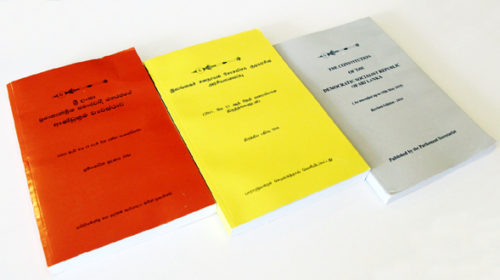BASL calls for strong independent institutions through 21A

- Warns failure to create independent institutions will negatively affect future law reforms and rule of law
- Claims recent constitutional reform was a result of the public outcry due to the economic crisis
- Says 21A does not restore status quo which prevailed prior to 20A
- Calls on the President and all responsible to ensure integrity of nominations to independent institutions
The Bar Association of Sri Lanka (BASL) has called for strong independent institutions to be created through the 21st amendment to the constitution. Issuing a statement, the BASL warned that any failure of the 21A to address the issue of creating strong independent institutions will have a bearing on future law reform initiatives and have an adverse impact on the Rule of Law in Sri Lanka.
Commenting on the 21A, the BASL noted that the necessity to amend the Constitution arose as a result of the public outcry that sprung up throughout the country in response to the present economic crisis. “It has been perceived that the causes of the crisis include the lack of checks and balances on the powers of the Executive including the Executive Presidency. The 20th Amendment to the Constitution rolled back the checks and balances which were introduced by the 19th Amendment on the exercise of executive power.” it said.
“The 21st Amendment to the Constitution regrettably does not completely restore the status quo ante which prevailed prior to the 20th Amendment to the Constitution and does not place adequate checks and balances on the powers of the Executive President.” it added.
While noting that it had raised concerns about the appointment process of members into independent commissions the BASL said it is essential that the Constitutional Council and the Independent Commissions be independent, impartial and be institutions that will help restore confidence in Sri Lanka and its Institutions.
The BASL thus called on the President, Prime Minister, Speaker, Leader of the Opposition, and all political parties represented in Parliament, to firstly ensure the integrity of nominations to the Constitutional Council and to ensure that such nominations are devoid of partisanship and in a manner that will inspire public confidence.
“For this purpose, it is important to ensure that the non-ex-officio members of the Constitutional Council appointed from among Members of Parliament and from among non-Members of Parliament be done in a transparent and open manner and to also ensure that those appointed will be acceptable to the members of the public and be persons of the highest integrity and reputation.
After the Constitutional Council is established, it should thereafter adopt a transparent, open and inclusive process by which it nominates chairpersons and members of Independent Commissions and other institutions established by the Constitution and other laws.” the BASL said.